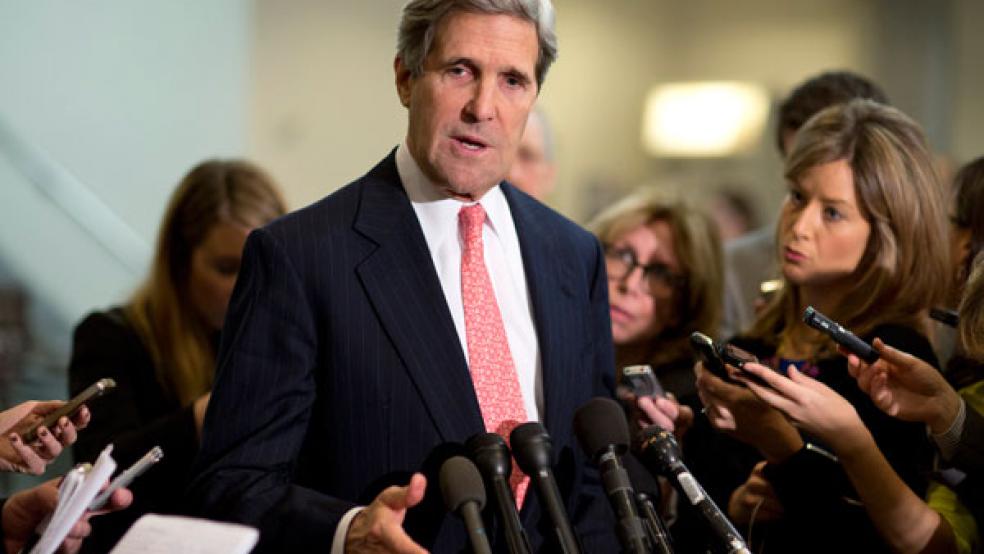The United States has had formal diplomatic relations with Thailand since 1833, and the country has been the most important American ally in Southeast Asia since the end of World War II. It’s a major trading partner, and is home to $13 billion in U.S. foreign investment. It’s also an important player in the fight against terrorism, allowing the United States to store equipment and come and go without approval.
All of this makes the current situation in Thailand a difficult one for Secretary of State John Kerry: The Thai military has staged a coup, taking control of the government after six months of protests calling on Prime Minister Yingluck Shinawatra to resign.
Related: U.S. Plays Catch-Up with China on Cyber Warfare
Reports indicate that the country is now under martial law. Troops patrol the streets. CNN has been pulled off the air.
The politics behind the coup are complicated. The protestors, who call themselves the People’s Democratic Reform Committee and are led by former Democrat Party Member of Parliament Suthep Thaugsuban, maintain that Yingluck is a puppet for her brother Thaksin Shinawatra. Thaksin was ousted in a military coup in 2006.
Thai generals refuse to call the military action a coup, and instead have referred to it as imposing martial law needed to restore order after violent clashes. They also fear that calling it a formal coup would bring condemnation from Washington, including economic sanctions.
All of this puts Kerry in a tight spot. His initial response to the coup — a term used by the State Department for the first time on Thursday — was tepid, but he did mention possible sanctions.
Related: After Missteps, Kerry Cuts Bait on Mideast Peace Talks
“I urge the restoration of civilian government immediately, a return to democracy, and respect for human rights and fundamental freedoms, such as press freedoms. The path forward for Thailand must include early elections that reflect the will of the people,” Kerry said in a statement Thursday.
Kerry then hinted that U.S. military aid to Thailand could be at risk.
“While we value our long friendship with the Thai people, this act will have negative implications for the U.S.–Thai relationship, especially for our relationship with the Thai military. We are reviewing our military and other assistance and engagements, consistent with U.S. law,” Kerry said.
The amount of direct military assistance Thailand receives from the U.S. is small by American standards; last year, Thailand received just $11.3 million in aid from the U.S., most of it going to Thailand’s military.
Related: How the U.S. Helped Fund the Egyptian Coup
The relationship between Thailand and the U.S. is about more than that aid, though. Thailand’s importance as an ally stems from its location. In the unlikely event that a war with China ever broke out, the country, which shares a peninsula with Vietnam, would be an important staging ground for American forces.
The country also is an active participant in joint military exercises with American and other regional allies. These drills are an important show of force in Southeast Asia, with the Thais conducting some 40 every year.
The Thais host one of the important exercises, known as Cobra Gold. Indonesia, Malaysia, South Korea, Singapore, and Japan all participate. Some 4,000 American soldiers participated this year, making it the largest military drill in the Pacific.
Parallels with Egypt
The closest parallel to the Thai situation is last year’s coup in Egypt, when the Egyptian military ousted democratically elected President Mohamed Morsi.
The State Department still has not called what happened in Egypt a coup, but it did suspend some military aid to the country. However, according to reports, some of that aid has been quietly restored.
Kerry has yet to speak publicly about the crisis in Thailand. If and when he does, he’ll have to weigh whether the military benefits Thailand provides outweigh the right of Thais to be ruled by a democratically ruled government. It’s a difficult choice and one that, like Kerry’s decisions in Egypt, will play an important role in his legacy at State.
Top Reads from The Fiscal Times:





